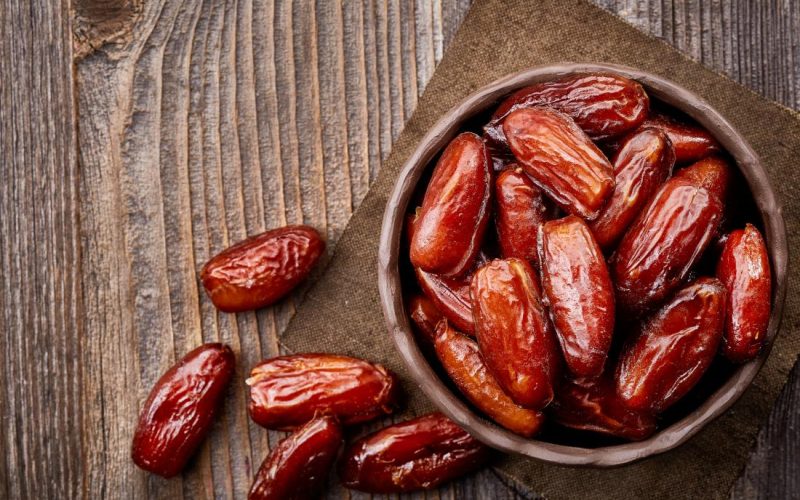Dates (called dabino by the Hausa people of Northern Nigeria) are the fruit that comes from the date palm tree, which grows in many tropical parts of the world. In recent years, dates have acquired some fame, and for good reasons.
Almost all dates available for sale in Western countries are dried to increase their shelf life.
You can quickly tell whether dates are fresh or dried based on their skin appearance. A wrinkled skin means the dates are dried, whereas dates with a smooth coat are fresh.
Depending on the type of dates, fresh ones have a reasonably small size and have colors that range from bright red to bright yellow. The most commonly consumed variety of dates are the Medjool and Deglet dates.
Dates have a sweet rush flavor and a soft, chewy consistency. They also contain high amounts of essential nutrients and offers a wide range of advantages and uses.
In this article, we will be sharing 8 of the most prominent benefits of eating dates and how to include them in your diet.
1. They are Very Nutritious
The nutrition profile of dates is quite impressive.
Since dates are dried fruits, they contain a higher calorie content than most fresh fruit. The calorie content of dates is similar to that of other dried fruits, such as raisins and figs.
A large percentage of the calories in dates are from carbs. The remaining portion comes from a very tiny volume of protein. Regardless of their caloric content, dates are packed with some essential vitamins and minerals coupled with a fantastic amount of fiber.
A Serving of 3.5-ounce (100-gram) of dates provides the nutrients below:
| Carbs | 75 grams |
| Potassium | 20% of the RDI |
| Calories | 277 |
| Protein | 2 grams |
| Fiber | 7 grams |
| Magnesium | 14% of the RDI |
| Copper | 18% of the RDI |
| Vitamin B6 | 12% of the RDI |
| Manganese | 15% of the RDI |
| Iron | 5% of the RDI |
Dates also contain high amounts of antioxidants, which helps the body to get rid of harmful toxins and contribute to many of the fruit’s health benefits.
2. High in Fiber
Getting the right amount of fiber is essential for your overall well-being.
With almost a single 3.5-ounce serving of dates containing 7 grams of fiber, including this fruit in your diet is a fantastic way to up your intake of fiber.
Fiber can help you maintain a healthy digestive system by preventing constipation. It encourages regular bowel movements by bulking up your stool and making it easy to expel.
In one study of 21 individuals who were made to consume seven dates a day for 21 days, it was discovered that they experienced improvements in the frequency of their stool. There was also a record of a significant increase in their bowel movements compared to the time before they started eating dates.
Furthermore, you may benefit from blood sugar control because of the fiber in dates. Fiber is known to slow down digestion, which may help to prevent high spiking blood sugar levels after eating.
This is the reason why these fruits have a low glycemic index (GI). The GI measures how fast your blood sugar increases after eating a particular food.
3. Contains high levels of Disease-Fighting Antioxidants
Dates are packed with various antioxidants that have many great health benefits to offer, such as a reduced risk of many diseases.
Antioxidants serve as protection to your cells against free radicals, which are harmful molecules that may cause adverse reactions in the human body and cause disease.
Compared to other fruits similar to dates, such as dried plums and figs, dates have been proven to have the highest antioxidant content.
Here is a short overview of the three most active antioxidants in dates:
- Flavonoids: Flavonoids are potent antioxidants that may assist with reducing inflammation and have also been studied for their likeliness to minimize the chances of Alzheimer’s disease, diabetes, and certain types of cancer.
- Carotenoids: Carotenoids are antioxidants that have been proven to promote a healthy heart and may also lessen the risk of eye-related disorders, like macular degeneration.
- Phenolic acid: This antioxidant is known for its potent anti-inflammatory properties. Phenolic acid can help to lower the risk of heart disease and cancer.
4. May Promote Brain Health
One of the benefits of eating dates is it’s potential to improve brain function.
Laboratory studies have revealed that dates can help reduce inflammatory markers, like interleukin 6 in the brain. A high IL-6 level in the brain is associated with an increased risk of neurodegenerative diseases such as Alzheimer’s.
Additionally, it has been revealed through animal studies that date is helpful for the reduction in the activity of amyloid-beta proteins, which can create plaques in the brain.
When there is an accumulation of plaques in the brain, they may cause a disturbance in the communication between brain cells, which may ultimately cause the death of brain cells and Alzheimer’s disease.
One of the animal studies revealed that mice that were fed with food mixed with dates had better learning ability and memory, as well as reduced anxiety-related behaviors when they were compared to rats that did not eat dates.
The likely brain-boosting properties of this fruit have been connected to their high antioxidant content known to lessen or eliminate inflammation, including flavonoids.
However, there is a need for human studies to confirm the role played by dates in brain health.
5. May Promote Natural Labor
Dates have recently been studied for their likelihood of promoting and ease late-term labor in expectant mothers.
Eating dates throughout the last couple of weeks of pregnancy may aid cervical dilation and reduce the requirement for induced labor. Dates may also be of help for the reduction of labor time.
In one research, 69 women who are half a dozen dates per day for a month before their due date had a 20% more likely chance to go into labor naturally and were in labor for a significantly less time frame than women who did not eat dates.
Another research of 154 pregnant women revealed that people who included dates to their diet have a lesser likelihood of getting induced compared to those who did not.
Another study revealed similar outcomes in 91 pregnant women who ate 70–76 grams of dates every day at the 37th week of pregnancy. The women were in active labor for about four fewer hours than women who did not eat dates.
Although these studies suggest that eating dates help with promoting labor and reduce labor duration, there is a need for more research to confirm these results.
The role possibly played by dates in pregnancy may be due to compounds that attach to oxytocin receptors and seem to mimic the effects that oxytocin has on the body. The hormone responsible for labor contractions during childbirth is oxytocin.
Additionally, dates have compounds known as tannins that have been discovered to help facilitate contractions. They have also be found to be a fantastic source of natural sugar and calories, which are vital to the maintenance of energy levels during labor.
6. Excellent Natural Sweetener
Dates are a fantastic source of fructose which is a naturally occurring sugar in fruits.
Because of their fructose content, dates are delicious and have a slightly caramel-like taste. They make quite a healthy substitute for white sugar in many food recipes due to the fiber, nutrients, and antioxidants that they offer.
The best and easiest way to use dates in the place of white sugar is to make date paste. You can make this paste by mixing dates with water in a blender. Take note of the rule of thumb to replace white sugar with date paste at a 1:1 ratio.
For instance, if the recipe requires the use of 1 cup of sugar, you will have to replace it with the same amount of date paste.
It is vital to note that even though dates are high in nutrients and fiber, they still have a reasonably high caloric content and are best consumed in moderation.
7. Other Potential Health Benefits
Dates are believed to have several health benefits that are yet to be studied extensively.
Bone health: Dates have several minerals, including potassium, phosphorus, calcium, and magnesium. All of these minerals have been researched for their potential ability to prevent bone-related conditions such as osteoporosis.
Blood sugar control: As earlier mentioned, dates can help with regulation of blood sugar as a result of their low fiber, glycemic index, and antioxidants. Thus people may benefit from eating dates for diabetes management.
Although the potential health benefits of dates mentioned here are promising, more human studies are required before any conclusions can be made.
8. Easy to Add to Your Diet
Dates are very versatile and serve as a delicious snack. People often paired dates with other foods. You can pair them with things like cheese, almonds or nut butter.
Dates also have a very sticky consistency, which makes them great as a binder in baked foods, such as bars and cookies. You can also combine nuts and seeds with dates to form healthy energy balls or snack bars.
What else can you use them for? You can use dates as a sweetener for sauces, such as marinades and salad dressings, or blend them into different smoothies and oatmeal.
It is essential to note that dates contain high-calorie levels, and they have a sweet taste that makes it easy for people to overeat them. For this reason, dates are best consumed in moderation.
The conclusion
It is a healthy thing to include dates to your diet because they are a healthy fruit.
Dates have a high content of several fiber, nutrients, and antioxidants, all of which can provide amazing health benefits ranging from a reduced risk of disease to improved digestion.
There are so many ways to include dates to your food. One common way to eat this fruit is as a natural sweetener in different dishes. You can also consume them as a snack.
It’s more common to find dates in their dried state, even though they are higher in calories than the fresh variety, so it is essential to eat them moderately.
Dates are nutritious and delicious, and easy to find.
Leave a comment below if you have any questions or contributions.





